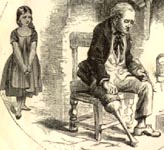Ellis Island 1891-1924: Immigration, Public Health, and the American Workforce
At this workshop, educators will be "joined by immigration scholars and public health historians, visit related historic sites in New York City that vividly tell the story of immigration in the early part of the 20th century, and investigate Ellis Island's un-restored hospital buildings with an architectural historian to uncover their significance." The workshop will "specifically address the impact of the 1891 immigration legislation mandating health as a criterion for admission to the U.S., precipitating construction of the U.S. Public Health Service hospital on Ellis Island to screen and treat arriving immigrants."
